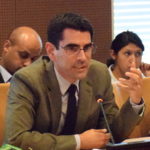The event will be chaired by Pali Lehohla, Former Statistician General of South Africa and MPPN Steering Committee member. Confirmed speakers include Lisa Grace Bersales, National Statistician of the Philippines; Suman Raj Aryal, Director General of the Central Bureau of Statistics for Nepal; Reinaldo Cervantes, Executive Director, National Institute of Statistics, Ecuador; Dr. Abdella Zidan, Chairman of the Bureau of Statistics and Census for Libya; Risenga Maluleke, Statistician General of South Africa; Albina Chuwa, Director General of the National Bureau of Statistics of Tanzania; Hedi Saidi, Director General of the National Institute of Statistics of Tunisia; Ivan Murenzi, Deputy Director, National Institute of Statistics, Rwanda; Rasha Saied, Statistician, Central Agency for Public Mobilization and Statistics, Egypt; Angélica M. Palma Robayo, Coord of Tech Cooperation, DANE, Colombia; and James Foster, Professor of Economics and International Affairs at The Elliott School of International Affairs, The George Washington University.
Also Selim Jahan, Director, Human Development Report Office, UNDP; Haishan Fu, Director of the Data Group, World Bank; Pascual Gerstenfeld, Director, Statistics Division, UN-ECLAC; Marwan Khawaja, Chief, Demographic & Social Stats, UN-ESCWA; and Sabina Alkire, Director, OPHI & Secretariat of the Multidimensional Poverty Peer Network (MPPN).
As in previous years, this side event will provide an opportunity for leading statisticians and MPPN members at the forefront of innovations in poverty measurement to discuss and share their experiences using multidimensional poverty measures.
If you would like to attend, please RSVP to mppn@ophi.org.uk with your name and job title. Please note: as the event will be held at UN Headquarters, it is unfortunately only accessible to those who have a UN security pass. We apologize for any inconvenience this may cause.
Agenda is available here.
Also see:
– UNSC 48th MPPN Side Event ‘Measuring the interconnected dimensions of poverty to energize policy’
















Recent Comments